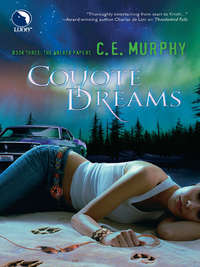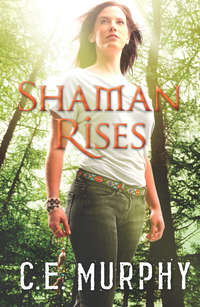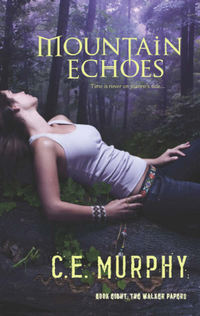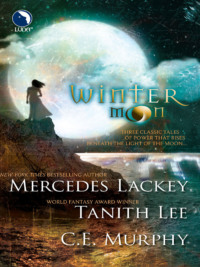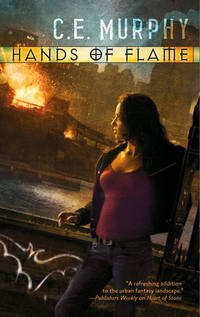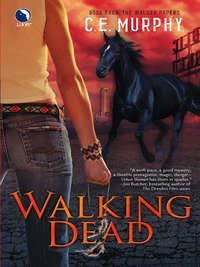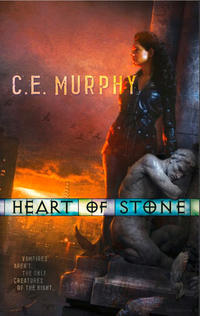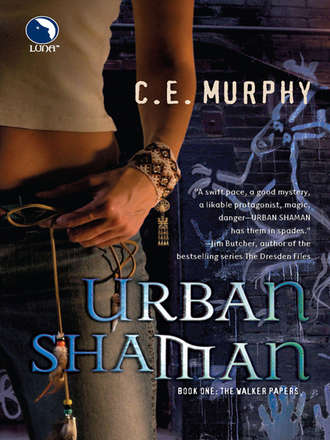
Полная версия
Urban Shaman

Praise for
C.E. MURPHY
and her books:
The Walker Papers
Coyote Dreams
“Tightly written and paced, [Coyote Dreams] has a compelling, interesting protagonist, whose struggles and successes will captivate new and old readers alike.”
—Romantic Times BOOKreviews
Thunderbird Falls
“Thoroughly entertaining from start to finish.”
—Award-winning author Charles de Lint
“The breakneck pace keeps things moving…helping make this one of the most involving and entertaining new supernatural mystery series in an increasingly crowded field.”
—LOCUS
“Fans of Jim Butcher’s Dresden Files novels and the works of urban fantasists Charles de Lint and Tanya Huff should enjoy this fantasy/mystery’s cosmic elements. A good choice.”
—Library Journal
Urban Shaman
“C.E. Murphy has written a spellbinding and enthralling urban fantasy in the tradition of Tanya Huff and Mercedes Lackey.”
—The Best Reviews
“Tightly plotted and nicely paced, Murphy’s latest has a world in which ancient and modern magic fuse almost seamlessly…Fans of urban fantasy are sure to enjoy this first book in what looks to be an exciting new series.”
—Romantic Times BOOKreviews
[nominee for Reviewer’s Choice Best Modern Fantasy]
The Negotiator
Hands of Flame
“Fast-paced action and a twisty-turny plot make for a good read…Fans of the series will be sad to leave Margrit’s world behind, at least for the time being.”
—Romantic Times BOOKreviews
House of Cards
“Violent confrontations add action on top of tense intrigue in this involving, even thrilling, middle book in a divertingly different contemporary fantasy romance series.”
—LOCUS
“The second title in Murphy’s Negotiator series is every bit as interesting and fun as the first. Margrit is a fascinatingly complex heroine who doesn’t shy away from making difficult choices.”
—Romantic Times BOOKreviews
Heart of Stone
“[An] exciting series opener…Margrit makes for a deeply compelling heroine as she struggles to sort out the sudden upheaval in her professional and romantic lives.”
—Publishers Weekly
“A fascinating new series…as usual, Murphy delivers interesting worldbuilding and magical systems, believable and sympathetic characters and a compelling story told at a breakneck pace.”
—Romantic Times BOOKreviews
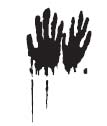
C.E. Murphy
Urban Shaman
Book One: The Walker Papers

This book is for my grandfather,
Francis John Joseph McNally Malone,
who would have been proud of me.
Acknowledgments
I hardly know where to begin saying thank you. Starting at the end and working my way backward seems appropriate.
First: my editor, Mary-Theresa Hussey, for taking a chance on a brand-new author; my agent, Jennifer Jackson, for her enthusiasm; and cover artist Hugh Syme, whose work I’m delighted to have my book judged by.
Second: Trip, for pointing out the glaring error in the rough draft and thereby making this a much better book; Silkie, for demanding the next chapter every time she saw me; and Sarah, my critique partner extraordinaire.
Third: my family, who never once doubted they’d be holding one of my books in their hands one day…
And most of all, Ted, who looked out the airplane window in the first place.
CONTENTS
CHAPTER ONE
CHAPTER TWO
CHAPTER THREE
CHAPTER FOUR
CHAPTER FIVE
CHAPTER SIX
CHAPTER SEVEN
CHAPTER EIGHT
CHAPTER NINE
CHAPTER TEN
CHAPTER ELEVEN
CHAPTER TWELVE
CHAPTER THIRTEEN
CHAPTER FOURTEEN
CHAPTER FIFTEEN
CHAPTER SIXTEEN
CHAPTER SEVENTEEN
CHAPTER EIGHTEEN
CHAPTER NINETEEN
CHAPTER TWENTY
CHAPTER TWENTY-ONE
CHAPTER TWENTY-TWO
CHAPTER TWENTY-THREE
CHAPTER TWENTY-FOUR
CHAPTER TWENTY-FIVE
CHAPTER TWENTY-SIX
CHAPTER TWENTY-SEVEN
CHAPTER TWENTY-EIGHT
CHAPTER TWENTY-NINE
CHAPTER THIRTY
CHAPTER ONE
Tuesday, January 4th, 6:45 a.m.
There’s nothing worse than a red-eye flight.
Well, all right, that’s wildly untrue. There are lots of things worse than red-eye flights. There are starving children in Africa, hate crimes and Austin Powers’s teeth. That’s just off the top of my head.
But I was crammed into an airplane seat that wouldn’t comfortably hold a four-year-old child, and had been for so many hours I was no longer certain what species I belonged to. I hadn’t slept in over a day. I was convinced that if someone didn’t stay awake, the airplane would fall out of the sky, and I couldn’t trust anyone else to do the job.
My stomach was alternating between nausea from the airline meal I’d eaten hours earlier, and hunger from not eating another revolting meal more recently. I’d forgotten to take my contact lens case with me in my carry-on, and my eyes were burning. My spine was so bent out of shape I’d have to visit a chiropractor for a week to stand up straight again. I was flying back from a funeral to be fired.
Overall, starving children in Africa were taking a distant second to my own misery and discomfort. Shallow, but true.
A very small part of my mind was convinced that if the flight attendants would just let me into the unpressurized luggage compartment to find my contact case, everything would miraculously be right with the world. None of them would let me, so my contacts were welded to my eyes. Every several minutes I decided it wasn’t worth it and started to take them out. Every time, I remembered that they were my last pair and I’d have to suffer with glasses until I made an eye appointment.
I might have succumbed, but the glasses in question were also with my luggage. The idea of navigating a soft-focus world full of featureless faces gave me a headache.
Not that I didn’t have one anyway.
I climbed over the round man sleeping peacefully beside me and went to the bathroom. At least I could take the contacts out and stew them in tap water for a few minutes. Anything would be better than keeping them in my eyes.
Anything except my reflection. Have you ever noticed that the mirror is by far the largest object in those tiny airplane restrooms? I was a sick pasty color under the flickering florescent light, my eyes much too green against a network of bloodshot vessels. I looked like a walking advertisement for one of those “wow” eye-drop commercials. Second runner-up for Least Attractive Feature on an International Flight was my hair. I put my contacts in two little paper cups and set them ostentatiously on the appropriate sides of the sink, then rubbed water through my hair to give it some life again.
Now I looked like a bloodshot porcupine. Big improvement. The only thing on my person that didn’t look slimy was the brand-new silver choker necklace my mother’d given me just before she died. A Celtic cross pendant sat in the hollow of my throat. I wasn’t used to jewelry, and now that I’d been reminded it was there, it felt mildly horrible, like someone was gently pushing his thumb against the delicate flesh. I shuddered and put my contacts back in before weaving my way back down the aisles to my seat. The flight attendants avoided me. I couldn’t blame them.
I rested my forehead on a grease spot I’d left on the window earlier. The airlines, I thought, must have custodians who clean the windows, or there’d be an inches-thick layer of goo on them from people like me.
That thought was proof positive that I shouldn’t be allowed to stay up for more than eighteen hours at a time. I have a bad habit of following every thought to its miserable, pathetic little end when I’m tired. I don’t mean to. It’s just that my brain and my tongue get unhinged. Though some of my less charitable acquaintances would say this condition didn’t require sleep deprivation.
The plane had been descending for a while now, and I squinted at my heavy black wristwatch. The bright orange button for changing the time had become permanently depressed in Moscow, or maybe Venice. Probably Moscow; I’d found Moscow depressing, and saw no reason why the watch shouldn’t. It claimed it was 5:50 p.m., which meant it was almost seven in the morning. I frowned out the window, trying to find the horizon. The sky wasn’t turning gray yet, not flying into Seattle three days after New Year’s. I blinked at the darkness, trying to unglue my contacts again.
My eyes teared up and I spent a few minutes with my hands over them, hoping perversely that I didn’t blink the contacts out. By the time I could see again, the captain had announced the final descent into Seattle. Couldn’t they find a less ominous phrase for it? I don’t like flying as it is, even without the implication that before landing I might want to have all my worldly and spiritual affairs in order. I pressed my head against the window so I could see the ground when it came into view. Maybe I could convince it to let us land without it being our real final descent.
Or maybe not. The plane banked abruptly and began to climb again. A moment or two later the captain’s voice crackled over the intercom.
“Sorry about that, folks. Little disagreement over who got to land next. We’re going to take another spin around the Emerald City and then we’ll have you at the gate right on time.”
Why do airline pilots always call passengers “folks”? I don’t usually take umbrage at generic terminology—I’m one of those forward-thinkers who believes that “man” encompasses the whole darned race—but at whatever o’clock in the morning, I thought it would be nice to be called something that suggested unwashed masses a little less. Ladies and gentlemen, for example. Nevermind that, being an almost six-foot-tall mechanic, I had a hard time passing for a lady on a good day, which this wasn’t.
I watched lights slip away beneath us as we circled. If I have to fly, I like flying into cities in the dark of morning. There’s something reassuring and likable about the purposeful skim of vehicles, zooming along to their destinations. The whisk of cars meant that the people driving them had a goal, somewhere to be, something to do. That was a hell of a lot more than I had.
I stared down at the moving lights. Maybe I didn’t like them after all.
The plane dropped the distance that made me an active voyeur in people’s lives, instead of a distant watcher. I could see individuals under the streetlights. Trees became sets of branches instead of blurry masses of brown.
A school went by below us, swingsets empty. The neighborhood was full of tidy, ordered streets. Carefully tended trees, bereft of leaves, lined uniformly trimmed lawns. Well-washed cars reflected the streetlights. Even from the air well before sunrise, it screamed out, This Is A Good Place To Live.
The next neighborhood over didn’t look as posh. Wrong side of the metaphysical tracks. Cars were older, had duller paint and no wax jobs to make them gleam in the streetlights. Mismatched shingles on patched roofs stood out; lawns were overgrown. It wasn’t that the owners didn’t care. It was that the price of a lawnmower or a matched roof patch could be the difference between Christmas or no Christmas that year.
Not that I knew anything about it.
A whole street went by, lightless except for one amber-colored lamp, the kind that’s supposed to cut through fog. It made the street seem unnaturally vivid, details coming into sharp-edged focus below me.
A modern church, an A-frame with a sharp, nasty spire, was lit by the edges of the lone amber light. Its parking lot was abandoned except for one car, parked at an angle across two spaces, one of its doors hanging open. I wondered if it closed at all. Probably: it was a behemoth from the seventies, the kind of car that will last forever. I grew up with that kind of car. Air bags or no, the little crumply things they make today don’t seem as safe.
Someone tall and lean got out of the car, draping himself over the door as he looked down the street toward the functional light. Even from above I could see the glitter of light on the butterfly knife he played with, comfortable and familiar. Watching, I knew that he could play knife games in the dark and blindfolded, and he’d never stab a finger.
A woman broke into the amber light, running down the center of the street. She took incredibly long strides, eating a huge amount of distance with each step, but her head was down and her steps swerved, like she wasn’t used to running. Her hair was very long, and swung loose, flaring out as she whipped her head back to look behind her.
I twisted in my seat as the plane left the subdivision behind, trying to see.
A pack of dogs leaked out of the darkness. Their coats were pale gold under the amber light, and they loped with the casual confidence of a hunting pack following easy prey.
The woman stumbled, the pack gained and the plane took me away from them.
“You don’t understand. There is a woman in trouble out there.” It was the fourth time I’d said it, and the pilot kept looking at me like I was on drugs. Well, maybe I was. Lack of sleep has the same effect as certain narcotics. I was lodged in the door of the cockpit, other passengers pushing out behind me. Fourteen minutes had passed since I saw the woman. There was a knot of discomfort in my stomach, like I’d throw up if I didn’t find a way to help her. I kept hoping I’d burp and it would go away, but I didn’t, and the pilot was still eyeing me.
“And you saw this from the plane,” he said, also for the fourth time. He had that bright lilting sound to his voice that first grade teachers use to mask irritation. “There are lots of people in trouble, ma’am.”
I closed my eyes. They screamed with pain, tears flooding as I opened them again. Through the upwell, I saw an expression of dismayed horror cross the pilot’s face.
Well, if he was going to fall for it, I might as well milk it. “It was five minutes before we landed,” I quavered. “We circled around and came in from the northwest.” I lifted my wrist to show him the compass on my watch band, although I hoped that, being the pilot, he knew we’d approached from the northwest. “I was looking out the window. I saw a woman running down the street. There was a pack of dogs after her and a guy with a switchblade down the street in the direction she was running.”
“Ma’am,” he said, still very patiently. I reached out and took a fistful of his shirt. Actually, at the last moment, I grabbed the air in front of his shirt. I didn’t think security could throw me out of the airport for grabbing air in a threatening fashion, not even in this post-9/11 age.
“Don’t ma’am me…” I stared at his chest until my eyes focused enough to read his name badge. “Steve. Is that your name? Steve. Don’t ma’am me, Captain Steve. I just need to know our rate of descent. Humor me, Captain Steve. I work for the police department. You don’t want me to go to the six o’clock news after a murder’s been discovered and tell them all about how the airline wouldn’t lift a finger to help the woman who died.”
I didn’t know why I bothered. The woman was probably dead by now. Still, Captain Steve blanched and looked back over his shoulder at his instruments. I retrieved my hand and smiled at him. He blanched again. I guess my smile wasn’t any better than my hair or eyes just now.
“Hurry,” I said. “Once the sun comes up the streetlights will go off and I don’t know if I’ll be able to find her then.”
I left my luggage in the airport and climbed into a cab, trying to work out the triangulation of height, speed and distance. “Drive,” I said, without looking up.
“Where to, lady?”
“I don’t know. Northwest.”
“The airline? It’s just a couple feet down the term—”
“To the northwest,” I snarled. The cabby gave me an unfriendly look and drove. “Do you have a map?” I demanded a minute later.
“What for?”
“So I can figure out where we’re going.”
He turned around and stared at me.
“Watch the road!” I braced myself for impact. Somehow—without looking—he twitched the steering wheel and avoided the collision. I collapsed back into the seat, wide-eyed. “Map?” I asked, somewhat more politely.
“Yeah, here.” He threw a city guide into my lap. I thumbed it open to find the airport.
Airplanes go fast. I realize this isn’t a revelation to stun the world, but it was a little distressing to realize how far we’d flown in five minutes, and how long it would take to drive that. “All right, we’re going northwest of the lake.” I remembered seeing its off-colored shadow making a black mark below the plane as we’d left the subdivision behind. “Somewhere in Aurora.”
“Think? That ain’t such a good neighborhood, lady. You sure you wanna go there?”
“Yeah, yeah, I know. I’m trying to find somebody who’s in trouble.”
The cabby eyed me in the rearview. “That’s the right place to look.”
I glared at him through my eyebrows. He smiled, a thin I’ve-seen-it-all grin that didn’t really have any humor in it. He had gray eyes under equally gray, bushy eyebrows. He had a thick neck and looked like he’d be at home chewing on a stogie. I asked if he had a cigarette. He turned around and looked at me again.
“Those things’ll kill you, lady.”
His voice was rough and deep like a lifetime smoker’s. Surprise showed on my face and he gave me another soulless smile, reflected in the mirror. “My wife died of emphysema three years ago on our forty-eighth wedding anniversary. You want a smoke, kid, find it somewhere else.”
Sometimes I wonder if I have a big old neon sign stamped on my forehead, flashing Asshole. I retaliated with stunning wit: “I’m not a kid.”
Gray eyes darted to the mirror again, and back to the road. “You’re what, twenty-six?”
Nobody ever guessed my age right. Since I was eleven, people have misguessed my age anywhere from three to seven years in one direction or the other. I felt my jaw drop.
“It’s a gift,” the cabby said. “A totally useless gift. I can tell how old people are.”
I blinked at him.
“Great way to get good tips,” he went on. “I go into this long explanation of how I always get ages right, and then I lie. Works like a charm.”
“So why’d you guess my age right?” The question came out of my mouth without consulting my brain first. I didn’t want to have a conversation with the cabby.
“Never met anybody who didn’t want to be in their twenties, so what’s the point? Why you going out there, lady? Lotta trouble out that way, and you don’t look like the type.”
I glanced sideways at the window. A faint reflection looked back at me. He was right. I looked tired, hopeless and worn-out, but not like trouble. “Looks can be deceiving.” His eyes slid off the rearview mirror like he was too polite to disbelieve aloud. “It’s somebody else who’s in trouble,” I said. “I saw her from the plane.”
He twisted around yet again. “You’re trying to rescue somebody you saw from an airplane?”
“Yeah.” I flinched as he twitched the steering wheel to keep in our lane, again without looking. “What do you do, use the Force?”
He glanced at the road and shrugged before turning around again. “So, what, you’ve got a hero complex? How the hell are you gonna find one dame you saw from the air?”
“I passed a couple basic math classes in college,” I muttered. “Look, I got the approximate height and speed we were traveling from the pilot, so figuring out the distance wasn’t that hard. I mean, adjusting for the change in speed is kind of a pain in the ass, but—” I set my teeth together to keep myself from rattling on. It was a moment before I was sure I had enough control over my brain to continue without babbling. “Someplace in that vicinity there’s a modern church on a street with only one amber streetlight. If I can find it before the lights go out—”
“Then you’ll be the first one on a murder scene. You’re nuts, lady. You must be desperate for thrills.”
“Like it could possibly be any of your business,” I snapped.
“Touchy, too. Pretty girl like you oughta be on her way home to her sweetie, not chasin—”
“I don’t have one.” I admit it. I snarled again.
“With your personality, I can’t figure why not, lady.”
I leaned forward and rubbed my eyes with my fingertips, elbows on my knees. The knot of unpleasantness in my stomach felt like it was trying to push its way out through my sternum, pressuring me to act whether I liked it or not. The idea that it would go away if I could just find the woman was settled into my bones, logic be damned. “Haven’t you ever just really felt like you had to do something?”
“Sure. I felt like I really had to marry my old lady when she got knocked up.”
I was in a cab with Plato. His depth overwhelmed me. I lifted my head enough to stare over the back of the seat at his shoulder. He grinned. He had good teeth, clean and white and strong, like he hadn’t ever smoked. They were probably false.
“Never felt like I had to go chasing down some dame I saw from an airplane, nope. Guess I figured I had enough troubles of my own without adding on somebody else’s.”
I leaned against the window, eyes closed. “Maybe I’ve got enough that I need somebody else’s to make the load seem lighter.”
I could feel his gaze on me in the rearview mirror again. Then he grunted, a sort of satisfied noise. “All right, lady. Let’s go find your corpse.”
CHAPTER TWO
“Thanks for the vote of confidence.” I glowered out the window. I wouldn’t have been so annoyed if I’d felt more confident myself. The cabby—whose name was Gary, according to the posted driver’s license, and whose seventy-third birthday had been three days ago—drove like the proverbial bat out of hell, while I clung to the seat and tried not to gasp too audibly.
The streetlights were still on when we got to Aurora, and I wasn’t actually dead, so I felt like I shouldn’t complain. Gary pulled into a gas station. I squinted tiredly at the back of his head. “What are you doing?”
“Go ask if anybody knows where that church of yours is.”
My squint turned into lifted eyebrows. “I thought men couldn’t ask for directions.”
“I ain’t askin’,” Gary said with aplomb. “You are. Go on.”
I got.
The pimply kid behind the counter didn’t look happy to see me. Judging from his thrust-out lip and down-drawn eyebrows, I figured he wasn’t happy to see anybody, and didn’t take it personally. He smirked at me when I asked about the church. Smirking is not a nice expression. The only person in the history of mankind who’d been able to make smirking look good was James Dean, and this kid, forgive me Senator Bentsen, was no James Dean.
I tried, briefly, to remember if I’d been that sullen and stupid when I was sixteen. I figured the fact that I couldn’t remember didn’t bode well, and went straight for the thing I knew would have gotten my attention at that age: cash. I wasn’t usually prone to bribing people, but I was too tired to think of anything else and I was in a hurry. I dug my wallet out and waved a bill at the kid. His eyes widened. I looked at it. It was a fifty.
Shit.
“You better walk me to the church for this, kid.”


